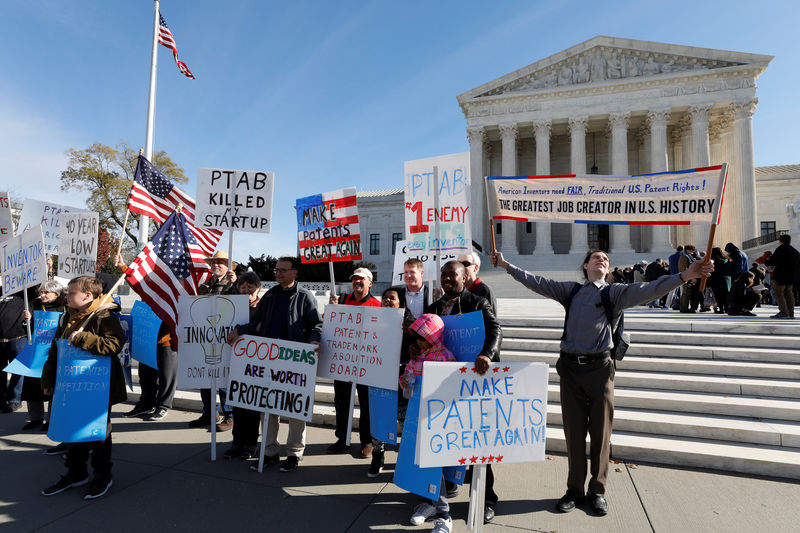By Andrew Chung
WASHINGTON (Reuters) - U.S. Supreme Court justices on Monday appeared divided over whether a federal agency's in-house process for challenging patents violates the constitutional rights of patent owners, leaving the fate of a system that has led to a high rate of patent cancellations uncertain.
In one of the most important Supreme Court patent cases in years, the nine justices heard an hour of arguments in a dispute over the U.S. Patent and Trademark Office's patent review proceeding, known as inter partes review (IPR). A decision to strike down the reviews could fundamentally change the way patents disputes are litigated in the United States.
Three of the court's liberal justices appeared sympathetic toward the review process, but other justices including conservatives John Roberts and Neil Gorsuch raised concerns that the government might be able to revoke patents too easily.
The reviews have become a quick and cheap way for companies to try to invalidate patents owned by competitors and others, and have been especially popular with high technology firms such as such as Apple Inc (O:AAPL) and Samsung Electronics Co Ltd (KS:005930) that are common targets of patent infringement suits.
On the other hand, name-brand pharmaceutical companies like AbbVie Inc (N:ABBV), Allergan plc (N:AGN) and Celgene Corp (O:CELG) call the review process a threat to innovation.
The U.S. Congress created the reviews as part of a 2011 law to deal with the perceived high number of poor-quality patents that had been issued by the patent office in prior years, which helped fuel the business model of so-called patent trolls that make money off patents rather than products.
The case arose from a dispute between two rival Houston-based oilfield services companies, Oil States International Inc (N:OIS) and Greene's Energy Group, over a patent on protecting wellhead equipment used in the hydraulic fracturing, or fracking, of oil wells.
In challenging the review process, Oil States argued that patents are private property that may be the revoked only by a federal court, and that the administrative procedures violate the U.S. Constitution's right to be heard by a federal court and jury. The standard for canceling a patent is higher in federal courts than in the review proceedings.
Liberal Justices Ruth Bader Ginsburg, Elena Kagan and Sonia Sotomayor noted that the patent office has long had the power to grant patents and invalidate wrongly issued ones after the fact.
"There must be some means by which the patent office can correct the errors it's made," Ginsburg said.
Sotomayor added that what "saves" the system is the fact that any invalidation can be appealed to the Washington-based U.S. Court of Appeals for the Federal Circuit for full judicial review, as happened in this case.
CONSERVATIVES RAISE DOUBTS
Gorsuch noted that judicial review is available only if someone appeals a patent review proceeding's decision, which does not always happen. He agreed with Oil States that a patent is a private right belonging to the inventor.
Chief Justice Roberts said Supreme Court precedents have frowned upon the government offering benefits on a conditional basis.
Roberts told Greene's Energy attorney Christopher Kise, "Your position ... is simply you've got to take the bitter with the sweet. If you want the sweet of having a patent, you've got to take the bitter that the government might re-evaluate it at some subsequent point."
Conservative Justice Anthony Kennedy and liberal Justice Stephen Breyer had tough questions for both sides.
The court is due to rule on the case by the end of June.
An Oil States subsidiary sued in 2012 claiming Greene's Energy infringed its patent. Greene's responded by filing an inter partes review at the Patent Trial and Appeal Board, the administrative tribunal run by the patent office that conducts the reviews. The board later canceled key parts of the patent. The Federal Circuit upheld that ruling last year.
Backed by the President Donald Trump's administration, Greene's Energy had the support of large technology firms like Alphabet's Google (O:GOOGL) and Intel Corp (O:INTC).
In about 1,800 final decisions up to October, the agency's patent board canceled all or part of a patent around 80 percent of the time.
